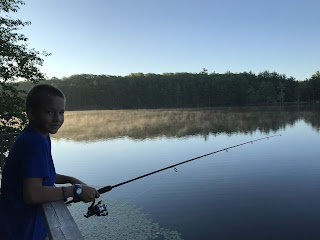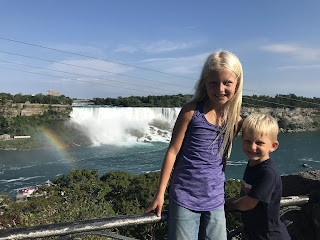What is Home Assignment (aka: Furlough)?
This is a good question, and something we have been asking ourselves since arriving in Canada 4 months ago. We had heard of missionaries spending time back in Canada, and while that was understood to be a part of this life, we didn't really know what this was supposed to look like. In all honesty I think we pictured it a lot more relaxing. Not unlike a prolonged holiday perhaps?
Okay, maybe not quite, but I did wonder what we would do with ourselves for the 6 months between coming back to our passport country and then leaving again for our new location at the Good News Hospital in Madagascar. In my minds eye, I had visions of plenty of family time, quality time with friends, reading and studying topics related to what we were doing, and then maybe dealing with the logistics and homeschooling on the side.
In reality, it has looked different then I expected. Not only is the world re-evaluating what they do and how to do it, we have been as well. Here are some of the things we have found ourselves doing with the transitional season we find ourselves in:
REVIEW
This time back in Canada has given us an opportunity to look at life and work overseas through a different lens. Being out of the very different (and sometimes very challenging) physical environment allows us the opportunity to gain clarity and perspective. Rather then navigating weather, language and cultural differences on top of the everyday work of living and the added burden of resource limitations, we get a chance to step back and look at the overall picture of life and work in Africa.
RECONNECT
Obviously one of the biggest sacrifices in being overseas is being so far from those we love. Home assignment allows us to bring our work with us, and do the appointments and paperwork and meetings while getting to spend time around friends and family who we have so dearly missed. It gives our children the opportunity to get to know their cousins and do life in a country they don't entirely remember. Not only that, it gives them a chance to be re-acquainted with the culture they have come from, and discover their roots while making new connections with old friends.
And it allows our families to get to relearn us and our kids! The decision to go means they also have to sacrifice their plans for what life would otherwise have looked like. Being back gives us a little time to "do life" together - at least get a taste.
REFOCUS
For Jesh and I, this has allowed us to evaluate what we are doing, why, and how. It provides a period of time where we get to reevaluate our vision, our work, our home life, and determine what has gone well, what hasn't, and what we need to change for the future.
RENEW
Quite literally - we have had to renew everything possible while we are in a country with more reliable postal services and the ability to visit the offices necessary to benefit from things like wonderful gift of healthcare. Or even repair some bad dental work, and replace a tooth. Who knew!
All the logistics that have gone into updating and renewing papers and getting visas and passports ready has been incredible. From lost licences to closed offices (cause you know, COVID) it's been no end of phone calls, emails and even faxes. (Who knew people still fax?!)
We have also been "renewing" our term overseas by transitioning to a new sending organization, while applying with the group that we will be working with at the hospital itself. We sure didn't realize how involved all of this would be!
REDO, RETRAIN, RELEARN
However, as we have had opportunity to reflect and re-tell what has gone on these last few years, we are reminded of what we are doing this for (or rather, WHO). God has been working in all of this, and it is such a privilege to walk this path and get to be a part of something so much bigger then ourselves.
Thank you for your part as you share in this journey with us!
Ready or not, Home Assignment will come to an end (end of November perhaps?), and we are just so thankful for this precious gift of time to ready ourselves for what's next.
By Julie






































